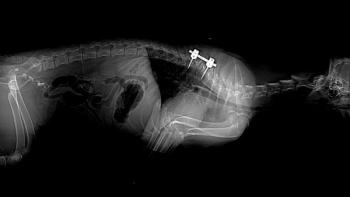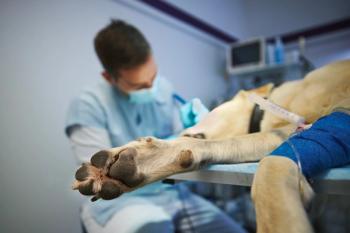
Acupuncture therapy for small animal neurologic conditions (Proceedings)
Acupuncture may be used as a primary therapy or as a complementary, integrative therapy in the treatment of various neurologic conditions.
Acupuncture may be used as a primary therapy or as a complementary, integrative therapy in the treatment of various neurologic conditions. It is essential that an appropriate neurologic evaluation be conducted in order to ascertain the most likely etiology of the neurologic condition. Lesion localization and etiology are critical in order to have a correct diagnosis and an appropriate prognosis. A thorough physical examination, appropriate blood and urine evaluations along with radiographs, nuclear scintigraphy, mri's may be beneficial for an appropriate neurologic diagnosis. Some of these diagnostic tests may not be readily available or financially feasible for the client. The goal is to do the most thorough diagnostic evaluation possible considering the client and the patient. Institution of therapy based on clinical judgment can be considered valid when neurodiagnostic procedures offer significant risk to the patient, surgical intervention is not an option ot the client is averse to the procedures (1). Nervous system signs consistent with systemic disease warrant a minimum database, including a cbc, serum biochemical profile, urinalysis, thoracic radiographs, as well as infectious disease evaluations and metabolic disease evaluation where indicated.
Acupuncture may be used therapeutically for neurologic conditions for both pain management as well as for nerve stimulation. One goal of acupuncture is to restore normal transmission of impulses (2). Acupuncture reduces the resistance and enhances electrical activity of injured tissues, thereby promoting healing and axonal regeneration (3).
Other nervous system disorders resulting from impaired function include epilepsy and sensorineural deafness. Research demonstrates that opioid peptides, serotonin, and g-aminobutyric acid are important brain neurotransmitters underlying the antiepileptic effect of acupuncture (4).
Acupuncture has been found to be beneficial as an adjunctive therapy in the treatment of many neurologic conditions. Brain disorders that may benefit from acupuncture include idiopathic epilepsy, cerebrovascular accident, acute cerebral hemorrhage, head trauma, coma and meningitis. Spinal cord disorders that may benefit include nonsurgical intervertebral disk disease, fibrocartilaginous embolism, spinal cord trauma, lumbosacral disease (cauda equine syndrome), cervical myelopathy and degenerative myelopathy. Spinal cord neoplasia does not normally respond to acupuncture. Occasionally, acupuncture may possibly accentuate the condition, by increasing local circulation to the area. If there is an aggravation of clinical signs following two acupuncture treatments or no improvement after four treatments or any other signs suggestive of spinal neoplasia become evident , one should reevaluate the patient. Further diagnostic procedures for the evaluation of a possible spinal tumor should be conducted if the client consents.
Neuromuscular disorders that may benefit from acupuncture include Cranial nerve VII neuropathy, Trigeminal neuritis (CNN V neuropathy), Geriatric peripheral vestibular syndrome (CNN VIII neuropathy) and neurogenic deafness. Traumatic peripheral neuropathies, diabetic neuropathyies and masticatory muscle myositis may also improve with acupuncture.
Acupuncture treatment techniques for neurologic conditions include dry needle stimulation, electroacupuncture and aquapuncture. Patients are normally treated once to twice weekly until clinical signs improve. In acute conditions, acupuncture may be utilized daily if appropriate. For analgesia and pain relief, improvement is often noted within four treatments. For nerve stimulation, one may require up to eight treatments before significant improvement is evident. Continuous evaluation of diagnosis, technique and additional therapies is important. Patience is a virtue when treating neurologic conditions. .
Acupuncture is considered a complementary or adjunctive therapy that should be used along with any appropriate conventional western medical approaches as well as additional complementary or integrative approaches.
References
Kline, K, Caplan,E, Joseph, R, Acupuncture for Neurologic Disorders, in Schoen, A., Veterinary Acupuncture, Ancient Art to Modern Medicine, 2nd edition, Mosby, St. Louis, 2001. pg. 179-192.
Loo, WC, Symptoms associated with impaired transmission of nerve impulses to different muscle areas and their treatment with acupuncture, Am J Acupunct 13:319-330, 1985.
Stefanatos, J: Treatment to reduce radial nerve paralysis, Vet Med 79:67-71, 1984.
Ding-Zong W, Acupuncture and neurophysiology, Clin Neurol Neurosurg 92(1): 13-25, 1990.
Newsletter
From exam room tips to practice management insights, get trusted veterinary news delivered straight to your inbox—subscribe to dvm360.






